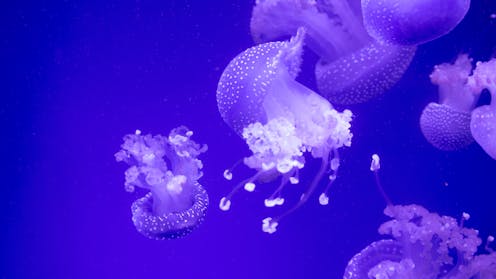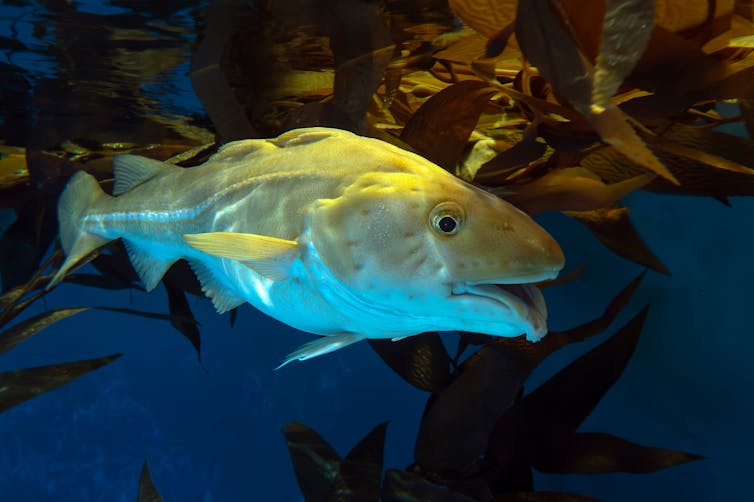Source: ForeignAffairs4
Source: The Conversation – UK – By Will de Freitas, Environment + Energy Editor, The Conversation

The ocean is heating up – in some places, faster than scientists once thought possible. For the fish, crustaceans and plankton that underpin life in the sea, this means habitats will shift, food supplies will change, and predators may suddenly find their prey has vanished. This isn’t a simple story of loss, but of winners and losers in a lottery weighted by climate change.
This roundup of The Conversation’s climate coverage comes from our award-winning weekly climate action newsletter. Every Wednesday, The Conversation’s environment editor writes Imagine, a short email that goes a little deeper into just one climate issue. Join the 45,000+ readers who’ve subscribed.
Fish are already threatened by polluted seas and overfishing by humans. Climate change adds another threat by reshaping the very waters they depend on – testing their ability to adapt.
Sevrine Sailley, a marine ecosystem modeller at Plymouth Marine Laboratory, explains:
“As the ocean heats up, fish try to stay in the conditions they’re best suited to. Some species will move, but others can’t relocate so easily – for example, if they need to live in a certain habitat at a particular life-stage, such as in kelp that offers shelter for breeding fish.”
Sailley and her colleagues used a computer programme to simulate the oceans around the UK over the rest of this century. They looked at 17 key commercial species and identified some winners and losers:
“While sardines may thrive, with a 10% boost in Atlantic abundance, our model suggests mackerel could decline by 10% in the Atlantic and 20% in the North Sea.”
Warm-water species like bluefin tuna could do well, she writes, but “bottom-dwelling species like cod and saithe (pollock) face a tougher future. These fish prefer colder, deeper waters and have fewer options to escape warming seas due to depth limitations.”
Read more:
How climate change is making Europe’s fish move to new waters
Sudden changes
Those fish are typically responding to what’s happening below them in the food web. And these shifts don’t just play out slowly. They can unfold dramatically during events such as marine heatwaves, when the sea itself becomes layered in ways that choke the food web.
Ocean scientist Tom Rippeth of Bangor University described this process during an “unprecedented” heatwave in the seas around the UK two years ago. That summer, the already-warm surface was heating up faster than ever.

Miroslav Halama / shutterstock
“Those stratified seas”, Rippeth writes, “on the continental shelf around Britain and Ireland are some of the most biologically productive on the planet. They have long been an important area for fishing cod, haddock, mackerel and other species. Those fish eat smaller fish and crustaceans, which in turn feed on microscopic plants known as plankton.”
Those plankton depend on nutrients mixed up from the deep water into the surface layer. However, during the marine heatwave, Rippeth feared the high surface temperatures would mean stronger stratification, less mixing, and a diminished supply of nutrients.
Bad news for the plankton. And bad news that will ripple up the food web.
Read more:
An ‘extreme’ heatwave has hit the seas around the UK and Ireland – here’s what’s going on
What the jellyfish tell us
Few creatures illustrate these shifts more clearly than jellyfish. Marine conservation expert Abigail McQuatters-Gollop of the University of Plymouth says jellyfish numbers are increasing in certain regions, including the UK. For her, this is a signal of dramatic changes in the ocean food web.
Jellyfish tend to feed directly on plankton, so they’re pretty low in the food web. In fact, since they drift rather than swim, they’re technically plankton themselves. Yet they’re big enough (and scary enough, in some eyes) for humans to notice when their numbers rise, which makes them an eye-catching indicator that waters are warming.
“Warmer sea temperatures”, McQuatters-Gollop writes, “mean that jellyfish can now inhabit a wider range of habitats, with some species moving polewards into waters that were once too cold for them.”
This has changed how energy moves through the food web:
“The warmer-water zooplankton species which now dominate northern European waters are generally smaller and less nutritious than the cold-water species they have replaced.”
It also contributes to what scientists call a predator-prey mismatch.
“While the seasonal cycle of phytoplankton [tiny plants] is driven by sunlight and so hasn’t changed, the point in the year when some zooplankton species [tiny animals] are most abundant now arrives earlier, as shorter and warmer winters cause the eggs of some species to hatch sooner. This has meant a mismatch between the spring phytoplankton bloom and the annual peak abundance of the zooplankton that gorge on it.”
These shifts cascade upwards through the food web – one reason why those warm-water bluefin tuna are likely to prosper in UK waters, while cold-water cod and herring are set to struggle.
Read more:
Jellyfish alert: increased sightings signal dramatic changes in ocean food web due to climate change
Post-carbon
Last week, we asked if severe heatwaves have affected your holiday plans. Several readers said they had given up on summer holidays in hot countries entirely.
For instance Andrew Strong said: “We are not holidaying in Europe between June and September, not even in the UK! It’s too much.”
Next week, we’d like your thoughts on air conditioning at home. Do you have it? Do you want it? Do you see it as an unnecessary and frivolous waste of energy, or an inevitable response to increasing summer heat? (If you’re American or Australian, do you laugh at us backwards Europeans for even having this debate?).
![]()
– ref. Winners and losers in a hotter ocean – https://theconversation.com/winners-and-losers-in-a-hotter-ocean-263556
